Prayer of the Heart
By Robert Fontana
The Greek Orthodox teach that the “heart of God” is anchored in the human heart because the human person is made in God’s image and likeness. The most ancient dwelling place for God in history is not the Ark of the Covenant (with the 10 commandments), not the temple in Jerusalem and not even in the Catholic tabernacle where the Eucharist is reserved. God dwells most intimately in God’s creation, especially in every woman and man because we are made in God’s image and likeness:
Then God said: Let us make human beings in our image, after our likeness. God created mankind in his image; in the image of God he created them; male and female he created them. Genesis 1:26-27

St. Paul agrees:
Do you not know that your bodies are temples of the Holy Spirit, who is in you, whom you have received from God? 1 Cor 6:19
Catholic teaching affirms this.
The desire for God is written in the human heart, because man [and woman are] created by God and for God, and God never ceases to draw [them] to himself. Catechism of the Catholic Church, Art. 27
Deep within his conscience man discovers a law which he has not laid upon himself but which he must obey. Its voice, ever calling him to love and to do what is good and to avoid evil, sounds in his heart at the right moment…. For man has in his heart a law inscribed by God…. His conscience is man’s most secret core and his sanctuary. There he is alone with God whose voice echoes in his depths. Catechism of the Catholic Church Art. 1776
The pathway to the heart of God is the human heart. Each is connected to the other. Every human being regardless of race, creed, color, sexual orientation, or political persuasion has a direct relationship with God “whose voice echoes in his/her depths.” And the fundamental truth that God speaks to every human being from the moment of conception until old age and death is, “My beloved child, I love you. Abide in me as I abide in you.” (John 15:4 adapted)
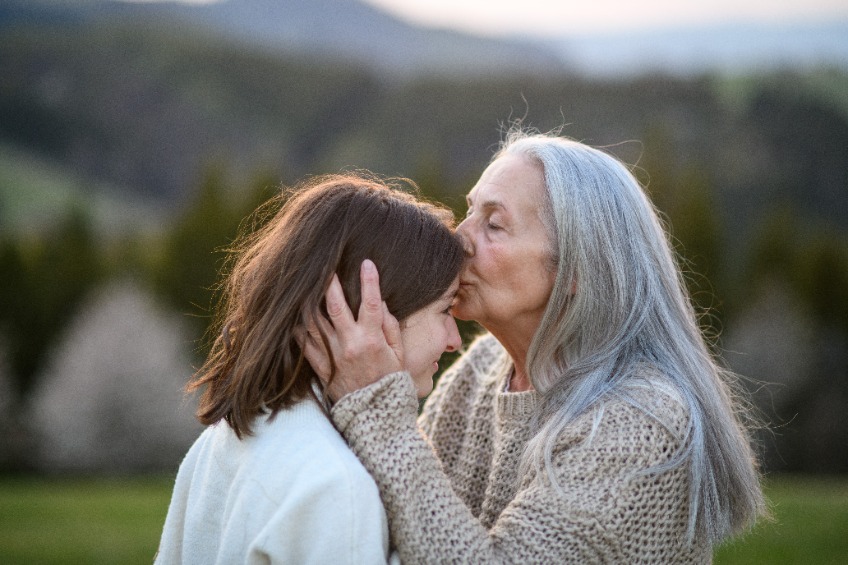
Of course, we humans have not abided in God. We all know the story of sin in the world and sin in our own hearts. We have been raised in our own family and in a Church community which have struggled to help us know our deepest identity in God. But childhood wounds, personal traumas, poor choices, addictions, and corruption in the Church and society have caused us to forget our deepest identity. We see this echoed so beautifully in the story of Zacchaeus the Jewish tax collector. (See Luke 19:1-10)
Zacchaeus is a Jewish man who, through his collaboration with the Romans as their tax collector, has forgotten his roots. He is a crook who has robbed his own people for material gain and has worked his way up to the top of his profession as the chief tax collector. Yet he is unhappy. He wants to see Jesus and so climbs a tree and gets into a place where he can see Jesus clearly. And when he does, Jesus calls out to him and says, “Zacchaeus, come down immediately. I must stay at your house today.”
Zacchaeus comes down with joy. He is already a changed person. The crowds, meanwhile, get angry at Jesus for staying at the house of a sinner. Jesus has never called Zacchaeus a sinner. He has never said to him, “Repent from your crimes, and get on your knees, and beg forgiveness from God and the people you have robbed.” All we know is that Jesus took the initiative to be with Zacchaeus and dine with him. Zacchaeus, for his part, shows that he has changed:
I give half of my possessions to the poor, and if I have cheated anybody out of anything, I will pay back four times the amount.
Wow! Jesus is impressed. He realizes that Zacchaeus now remembers who he is, where his deepest identity lies. It is not in being a tax collector, a rich and powerful man of the world. What does Jesus say?
Today salvation has come to this house, because this man, too, is a son of Abraham.
Jesus is the incarnation of God’s love. Whatever is in the heart of God is enfleshed in the person of Jesus. To encounter Jesus is to begin the process of rediscovering the deepest truth about oneself by hearing the voice of God say:
“My beloved child, I love you. Abide in me as I abide in you.”
What is the path of prayer to “abide with God?” It is the prayer of the heart, prayer that lets go of words, mental examinations, even imaginative play, and is simply being with God in silence and quiet. This is very Biblical:
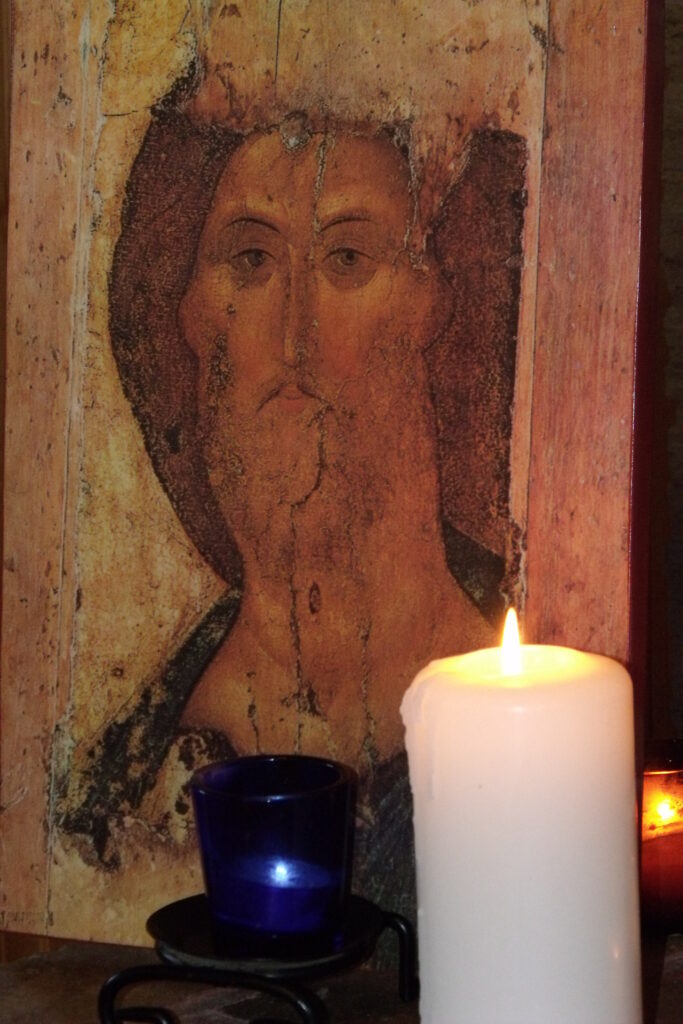
Be still and know that I am God. Psalm 46:10
When you pray, go to your inner room, close the door, and pray to your Father in secret. And your Father who sees in secret will repay you. In praying, do not babble like the pagans, who think that they will be heard because of their many words. Do not be like them. Your Father knows what you need before you ask him. Matthew 6:6-8
Slowly over time, by quieting the active mind, the anxious body, the restless soul, we humans learn to rest in God, to receive God’s love, and to let go of unnecessary attachments, fears, resentments, regrets, shames, and control, and finally find a measure of freedom to oneself in Christ. Joy wells up! Love wells up! Peace wells up! Not always, but most of the time.
Prayer of the heart, is a way of praying for every person, especially those like Zacchaeus who get up every day and go to work, even as a tax collector, to be a power for good, confident in one’s true identity as God’s beloved son or daughter.
Easter/Pentecost: A good time to question your religious, cultural, and personal beliefs and practices
By Robert Fontana
Yes, it is true. This is the good and proper season for questioning one’s belief systems. That’s what Thomas the apostle did after his friends claimed to have seen Jesus, whom Thomas knew was dead. Thomas responded, “Unless I see the mark of the nails in his hands and put my finger into the nail-marks and put my hand into his side, I will not believe.” John 20:25
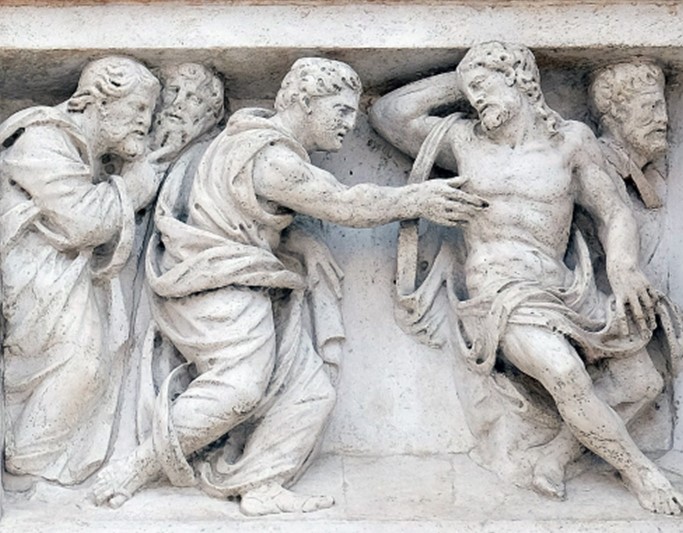
Thomas probably expressed the doubt that some of the others also felt. In fact, Luke’s version does state that all the disciples present were disbelieving in what they were seeing: But they were startled and terrified and thought that they were seeing a ghost. Then he said to them, “Why are you troubled? And why do questions arise in your hearts? Look at my hands and my feet, that it is I myself. Touch me and see, because a ghost does not have flesh and bones as you can see I have.” Luke 24:37-43
Healthy doubting and questioning can lead to greater understanding and conviction. This has been true in my life. For example, in struggling to understand what it means to live as a Catholic Christian in a world with sincere believers of other religions – Protestant, Orthodox, Muslim, Hindu, Buddhist, Native American, and even sincere practitioners of no religion – I have wrestled with: Is my way right and their ways wrong? Can we all be right? Are we all somewhat right and somewhat wrong?
What I came to see through this questioning was that I had a wrong attitude about the non-Christian world. I used to believe that it was completely void of God, and we Catholics and other Christians were bringing God to the world. I was a Catholic fundamentalist, conquering the world for Christ. I was convinced that “the other side” has nothing to offer, that they needed to surrender to my monologue of truth. When I came to see that God’s grace and presence abound in every human person and culture, that I have a truth to share but so do others, then I learned that respect and dialogue had to be at the core of my relationship with them.
Having the courage and skill to question one’s belief system is essential for mature spirituality and responsible engagement in the Church and in civic society today. This is especially true considering the influence of social media and the “either/or thinking” of both the left and the right in today’s Church and society. It also takes into consideration the modern levels of corruption that abound.
Many Catholics would not agree with this statement. Question the Church…or my pastor? Never!
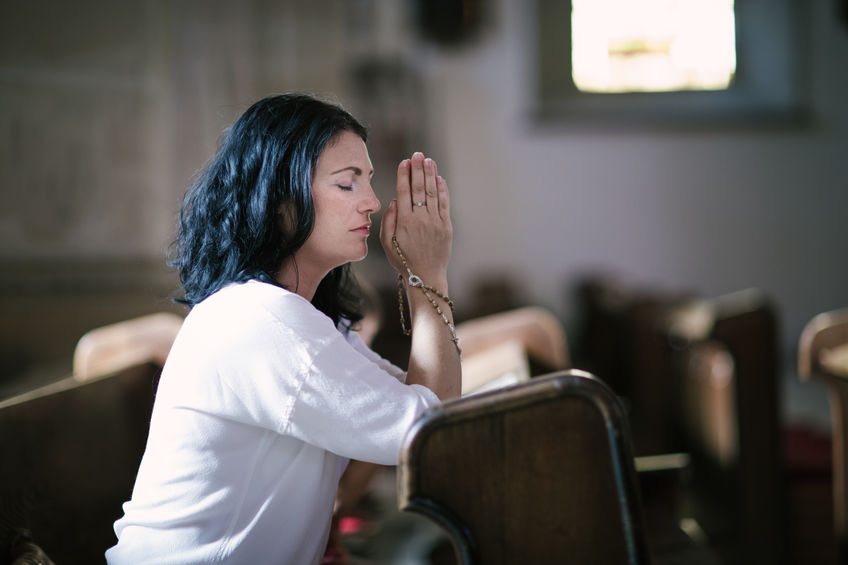
My mother once told me that she tithed weekly to the parish because that was her duty to God. What the pastor did with the money was his duty to God and not her concern. I told my mother that her way of thinking was a recipe for financial mismanagement in the church (she didn’t like hearing that). But apparently the bishops at the Second Vatican Council thought as I did because, although the bishops recommended parish councils in each parish, finance councils were mandated. Leading up to the Vatican Council in 1962, problems with incompetence and actual criminality among managers of the church’s financial resources were acknowledged. Sadly, these problems continue today:
The Michigan priest—pastor of the same parish for 30 years—who was convicted of stealing $573,000…for stock market investments and alcohol; the Philadelphia Archdiocese CFO who embezzled nearly a million dollars (gambling habit); the New York Archdiocese employee who embezzled nearly a million dollars to purchase additions to her expensive doll collection; the Florida monsignor who was accused of stealing as much as $8 million over his 40 years as pastor, [money] …used to purchase real estate and take expensive vacations with his mistress… (https://uscatholic.org/articles/201701/how-to-stop-embezzlement-in-your-parish/)
When it comes to money and management of church assets, the approach the Catholic faithful ought to have towards Catholic leadership who are managing affairs is the same approach that President Regan recommended in dealings with the Soviet Union: “Trust but verify.” But how? Learn about and question all budgets and expenditures and insist on full disclosure.
One of the most frustrating aspects of the clergy sex abuse crisis is that bishops are asking the faithful and the public at large to trust without verification. The first president of the National Review Board (which investigates clergy sex abuse), former Oklahoma governor Frank Keating, lamented that dealing with Cardinal Mahoney of the Los Angeles Diocese was like dealing with the Mafia. (See https://www.ncronline.org/news/accountability/keating-recalls-service-review-board)
Recently a grand jury investigation into the Baltimore Archdiocese disclosed cardinals, archbishops, and diocesan leaders who, for decades, covered up sexual abuse of minors and vulnerable adults and protected the clergy perpetrators of that abuse. Does it take a grand jury investigation in every diocese in the country to get at the truth of clergy sex abuse?
What are you and your parish leaders doing to probe and question your diocese’s handling of cases of sex abuse in the Church?

Probing and questioning my relationship with God, the Church, the USA, and even my family does not mean I do not love God, the Church, the USA, and my family. Probing and questioning of behaviors that seem unhealthy or confusing is what healthy relationships and healthy spirituality in adulthood demand.
Pope Francis clearly thinks this is true. He has challenged us Catholics to question how we welcome migrants in our countries, how we include divorced Catholics and gay and lesbian Catholics in our worship, and how we allow for the greater participation of women in the leadership of Vatican offices, issues not yet anticipated by the bishops at Vatican II.
Easter /Pentecost is a good time to examine and question your religious, cultural, and personal beliefs and practices.
What are some beliefs and practices that you hold dearly, that you get defensive about when others bring them up, that you need to probe and question?
Ask the Holy Spirit to instruct and guide you in the ways you need to mature and grow as an adult in your faith, your culture, and your beliefs.
Poetic Meditations
by Robert Fontana
I have never been one to read poetry. When I do I usually need someone to explain to me what I am reading. There are some exceptions to this. My daughter Mary introduced me to the poems of Mary Oliver. I found them very helpful. Last May I made a men’s wilderness retreat where the retreat leaders relied on poetry to help us understand the points they were trying to make. There efforts worked for me and encouraged me to try my hand at poetry to say more clearly and profoundly what I am experiencing in prayer. Here are a few poems for your Easter/Pentecost meditation:
I HAVE SEEN JESUS
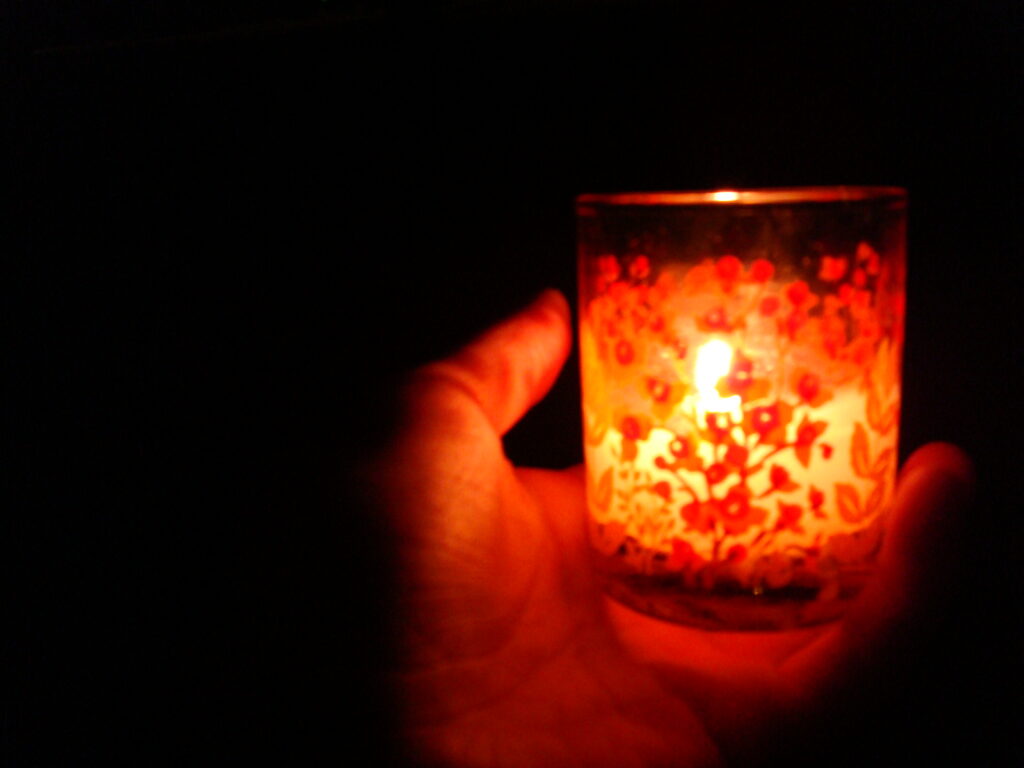
“Although you have not seen him, you love him” 1 Peter 1:8
I have seen Jesus, I have seen him. Oh, not the Jesus in robe and sandals walking along the shores of Lake Galilee. No, not him.
But I have seen the Jesus in my mother and father who worked night and day to feed and clothe their children; in my music teacher practicing, once again, to create a more beautiful sacred song; in the priest who listened to me with great compassion and gave me wisdom instead of reprimand; in my neighbors who gather weekly to feed our struggling neighbors in a pop-up kitchen; and in my elders who bear their aging pains with patience and face their approaching death with hope.
No, the Jesus who walked in history, who opened the eyes of the blind and ate with sinners and tax collectors, him I have not seen. But the risen Jesus alive in his people, that Jesus I have met over and over again. And I “rejoice with indescribable and glorious joy” (1 Peter 1:8) for I love him and he loves me.
FOREST CALLING

Come home, Human, come home. You don’t belong to the concrete, the noise, the buying and selling, the endless arguing, the despair, the fleeing from life.
No, that is not your home.
You belong here with the symphony of birds, with the gentle wind and soft rain, with the towering trees and lush ferns.
This is your true home, Human, where waters flow, trees grow, flowers bloom, squirrels play, children run, lovers walk, and elders listen.
Come home, Human, come home to the forest where you will find rest, acceptance, and a healing place to unlock your caged mind and heart, and be free.
TRINITY

Draw me into the warmth of your circle, O Trinity. Draw me into the intimacy of your sharing, singing, laughing, silence, and tears.
Draw me close, Abba, Jesus, Spirit. Draw me and all whom I love.
You do draw me into your inner circle, into your communion of life and love. You do enclose me in your friendship, trust, vulnerability, truth, and wildness of heart.
Holy Trinity, Great Mystery, Love Divine, cosmic and earthy, I sit in wonder and awe before your presence. Draw me close to you that I might be set free from what does not matter and set afire for all that does.
Are you an adult child of an alcoholic-angry-dysfunctional parent? There’s hope!

Dear Readers, I asked a friend to write about his experience as an adult child of an alcoholic. What he writes about applies to any relationship with a parent who created a home environment of emotional unpredictability, secrecy, and/or shame.
Hi. I’m Tim and I am the adult child of an alcoholic. This is how you introduce yourself at a meeting of Adult Children of Alcoholics (ACA). If it sounds familiar, it is. ACA is a 12-step program similar to AA, but intended for those who were raised in alcoholic or otherwise dysfunctional families. In my case, my mother was the alcoholic, but possibly more importantly my dad was an emotionally distant workaholic. A lot of his dysfunction was no doubt adaptive behavior from dealing with my mom’s addictions.
The name of the program is significant. It is not just simply that as a child you had an alcoholic parent and now you are an adult. Part of this condition is understanding that because you were inadequately parented as a child, you may be ‘stuck’ in some ways, hence becoming an ‘adult child’. The ACA recovery can apply to anyone who had a childhood where there was anger, neglect, dysfunction, abuse, or other addictions.
Core to the ACA journey to recovery is “Becoming Your Own Loving Parent”. The program encourages that you identify within yourself 4 voices or personas: Loving Inner Parent, Critical Parent, Inner Teen, and Inner Child. Adult children acknowledge that their biological parents were unable to parent in a loving, supportive way that allows for healthy emotional development.
The Loving Inner Parent can provide the acceptance and emotional support that we didn’t receive as children. The Critical Parent is the voice of shame. The Inner Teen and Inner Child represent the voices of various points of our childhood. Because of the dysfunctional parenting we received, there are parts of ourselves that are ‘stuck’ in childhood. The process of self-parenting is intended to heal the inner child and protect us against the Critical Parent.
I have only been following this path to recovery for several months. Like many of these journeys, it began with a crisis. Mine was dealing with crippling anxiety. My anxiety meant that weeks before what should be fun events, I would be so consumed with worrying about possible bad outcomes that by the time the event came, I would just be so glad to be done with it that I could find no joy in it. In seeking therapy, I learned that many ACA deal with anxiety. Our childhood experience of never knowing what family crisis would erupt leaves the impact of always being on guard and hypervigilant.
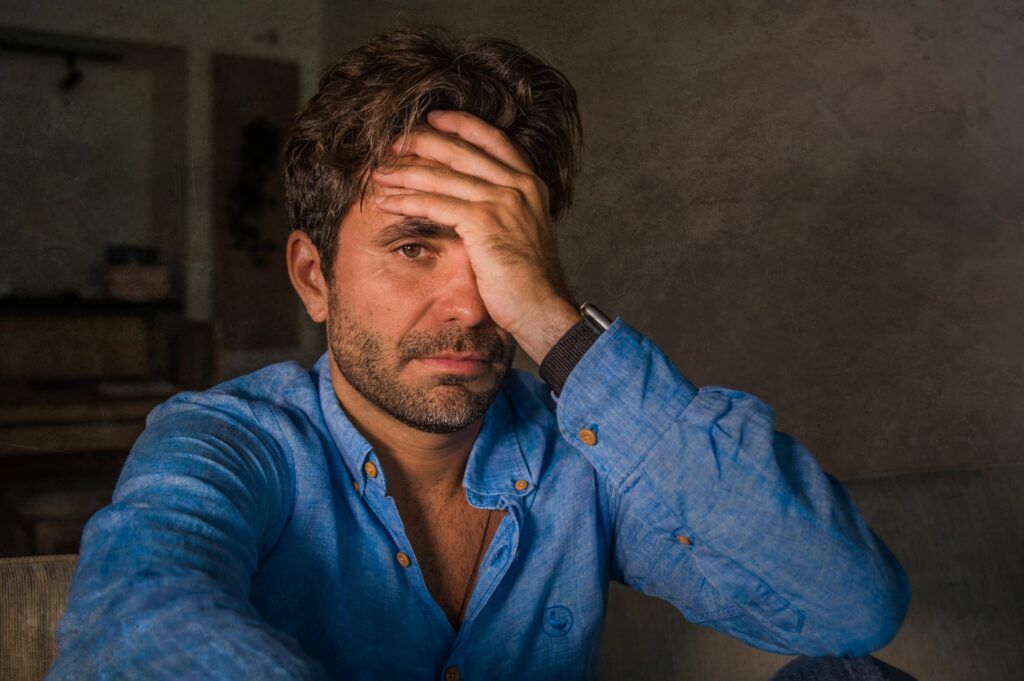
It is likely obvious that both the trauma of dysfunctional parenting as well as the journey to recovery have spiritual implications. Here are a few that I have found:
- Many of the steps in a 12-step program are about surrendering to pain in search of healing. We can’t begin to heal without accepting the nature of our condition, accepting that our parents failed us in some way, and acknowledging and making amends for our faults. To me, it follows the redemptive healing that Jesus accomplished in surrendering and accepting the suffering of the Cross for us.
- One fundamental lesson of ACA is how to love ourselves. Many adult children were not taught this by their parents due to their own illness. They heard instead that ‘they were in the way’, or possibly that the parent’s addiction was more important to them than their child. Our Loving Inner Parent teaches what the Gospel teaches: we are each worthy of love simply by being a human. In the same way that we can’t earn God’s love (or lose it), we have to be willing and ready to love ourselves. When I am anxious, my Inner Parent reminds me that God loves me, cares for me, and that all will be well.
- There is strength in community. When I hear the stories that other adult children share, I am really struck by the way that so many wounded souls walk among us. Like our faith journey, the path to recovery is an easier one in the company of ‘fellow travelers’. Even those who were not raised in dysfunctional families need to cope with the trauma of original sin. All souls are wounded and in need of compassionate, loving support. We see in both our faith communities and in communities of recovery Jesus’ loving presence in those around us.
The 12-steps traditions have variations of “The Serenity Prayer”. ACA’s version is “God, grant me the serenity to accept the people I cannot change, the strength to change the one I can, and the wisdom to know that one is me.” ACA tend to be overly responsible, wanting to ‘fix’ or ‘save’ anyone in their lives that they sense needs it. This prayer teaches that the only one I can save is myself. With God’s help, I can reparent myself to let the healing begin.
If any of this applies to your childhood, consider attending a meeting. Most are available on-line (thanks, Covid!). They are very easy to quietly attend in order to become familiar with what the program offers. To learn more or find a meeting, see https://adultchildren.org/.
Young people, will you succeed as spouses and parents? (Part II)
(An imaginary conversation between Robert and young adults in college, some churchgoers and some not. In Part I, young people talked about the impact of being raised in divorced families and expressed their desire to avoid divorce in their futures.)
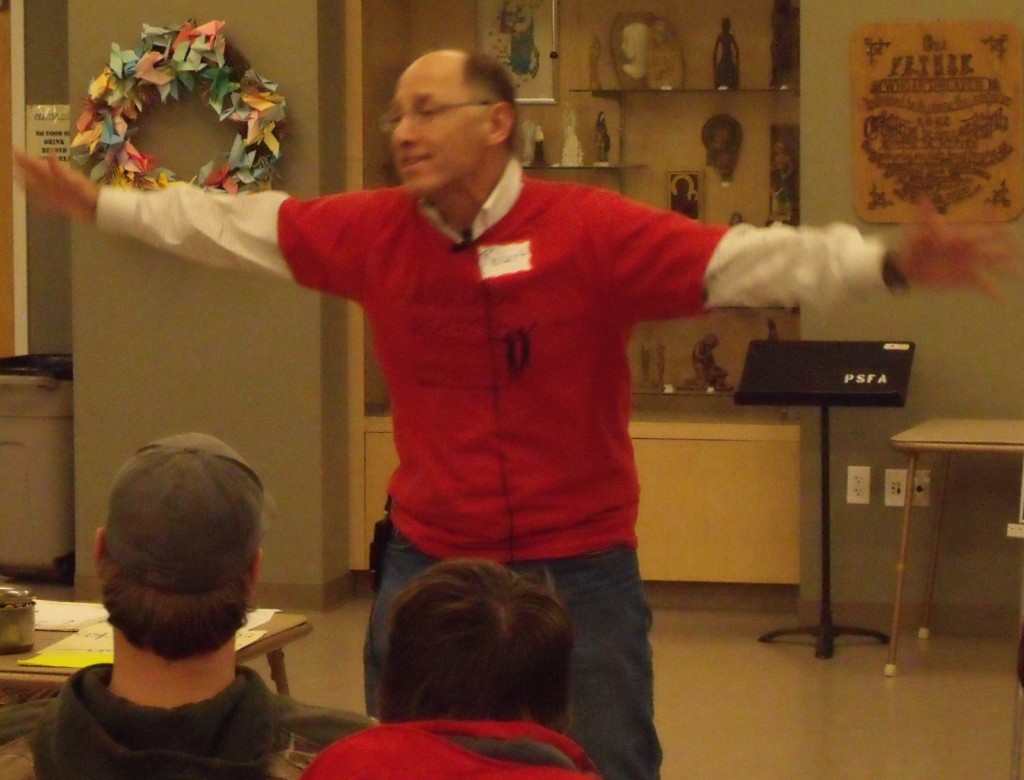
Robert It’s not too late for you to prepare now to be successful later as spouses and parents. Think about it. What preparations can you do now to help you succeed later in love/marriage and as a parent?
YP1 Don’t marry a jerk! (Others yell out, “Yeah, don’t hook up with an a_ _ h_ _ _ !”)
R Amen to that! But keep in mind that your moms and dads did not think the other was a jerk at the time they married. Maybe there were signs of problems that lay ahead that each ignored because they wanted so much to marry and did not want to have an argument.
YP1 My mom told me that she swore as a teenager that she would never marry a drunk like her own dad. But she did. She thought a baby and marriage would change Dad. It didn’t. She did everything to try to get him to sober up and be a good dad. He was a good dad when he was sober.
R Thank you for saying that. There’s so much pain in your story. It’s sad but true: men and women raised in families who struggle with drug or alcohol addiction often marry a partner who has some sort of substance dependency. If your boyfriend or girlfriend has a regular pattern of getting drunk or stoned now, marriage and parenthood are not likely to change that. The same is true if he or she treats you really badly when there’s a conflict – name-calling or a prolonged “silent treatment,” throwing things, etc. Moving in together, buying a house together, having a baby together and/or getting married will not usually change that behavior.
YP2 My girlfriend wasn’t a jerk; we just couldn’t get along after moving in together. She didn’t like how I stayed up late gaming; I didn’t like how messy she was. She didn’t like my work hours, and I didn’t like how she wouldn’t talk to me when she was mad. So, we broke up.
R Too bad you broke up.
YP2 What? How can you say that?
R Well, from what you told me, the two of you were learning some important things about each other. You were learning how different each was from the other. You just didn’t learn how to accommodate your differences so that the relationship could survive and thrive.
YP2 We were like two people playing tug-of-war.

R Many of your parents who divorced probably started growing apart for the same reasons. They were bumping into each other’s differences, which resulted in conflicts that they never learned to resolve. They didn’t have the tools to work through their differences. You see, you and your girlfriend had an unsolvable problem, as does every couple in the universe. You are not your girlfriend, and your girlfriend is not you!
It’s been documented by exhaustive research that 70% of all conflict between a couple has little to do with big moral issues such as, “Are we going to cheat on our income taxes this year?” or, “Shall we trash the neighbors’ yard?” Most conflict between two people in love comes from their having different histories and life experiences, different emotional temperaments and communication skills, and different expectations of the relationship. And when they bump into these differences, they don’t know how to negotiate them and find some common ground so that the relationship wins.
YP3 What do you mean by “the relationship wins?” Doing whatever my partner wants so that we don’t have a conflict? Dad tried that. “Happy wife, happy life,” he would say. That worked for a while. Then a little thing would set him off, and he would explode with anger.
R Great question. Denying my needs in this relationship and giving in to my partner’s is a recipe for my feeling hurt, unimportant, and resentful. For “the relationship to win,” we both have to make our emotional needs clear on any particular issue and work for common ground where we both get something we need. In my own marriage, when my wife and I each learned to say, “I won’t win at your expense, and I won’t let you win at my expense,” we began learning to resolve our differences. The relationship “won” because we were learning to trust that we had each other’s best interests at heart.
Now this may seem a bit odd to you all, but what we really learned was to seek “unity” in all things. By seeking “unity in all things,” in how we spent money, with cooking, work commitments, time together and time apart, we were able to resolve one potential conflict after another. Unity doesn’t mean “uniformity.” I will never be my wife, and she will never be me. After 45 years of marriage, we are still night and day different in many aspects of our personalities.
YP4 That sounds beautiful…and impossible.
R It is beautiful, and it is hard…and it is possible! Think about this. You are training right now to succeed in a particular career or area of work. You are not learning everything you need to know to succeed in these occupations, but you are laying a foundation on which you can build as you grow into your career. Can you also intentionally practice skills now which will help you succeed later in marriage? Since time is almost up, let me give you a list of skills you can develop now to succeed later as spouses and parents.

- Learn to grow in self-awareness. Take time each day learn about yourself, what you like and dislike, and why. Journal your thoughts. Pay attention especially to times when you have been hurt by another or when you have reacted strongly to another. Examine why you responded the way you did.
- Learn to listen to others for understanding. Work at listening without the motives of winning an argument, rebutting the speaker, or proving the speaker wrong. Especially with others with whom you may not have much in common, practice listening for the purpose of understanding. Remember, you can understand someone even if you don’t agree with what he / she is saying.
- Learn to validate another’s emotions. This is part of listening. Look for the emotions/ feelings behind the words. This is important because emotions drive behavior. By naming the feelings that are being expressed, the listener can convey care and a deeper understanding of the speaker.
- Learn to grow in friendship (especially with a romantic partner). Learn to share your likes and dislikes with trusted friends; and listen to their likes and dislikes. Identify how you are similar and dissimilar. Practice finding common ground. (By the way, friendship between spouses is one of the key ingredients for a lifelong successful relationship.)
- Learn to resolve conflict by seeking common ground and unity with another person.
- Learn to forgive and ask for forgiveness. There are no perfect relationships. We do hurt one another despite our best intentions. Sometimes forgiveness is what’s needed to heal and move forward in a relationship.
Lenten 2023 Goal: Doing jigsaw puzzles…really!
By Robert Fontana
Lent challenges me to do what Jesus advised: take the “beam” from my eye before I try taking a “splinter” from someone else’s eye. (Matthew 7:3-5) And this Lent, I’ve decided that jigsaw puzzles are going to help me (and us) do that.
You might ask, “Just how is doing a jigsaw puzzle helping me take “the beam out of my eye?” First, working on a jigsaw puzzle demands paying attention to details (not an easy thing for me). It’s a quieting exercise that requires slowing down and searching for shapes and colors that connect. There is also a beautiful intimacy to it. Lori and I sit next to each other. We help one another out, cheer each other on, and commiserate together when it seems impossible. And then, we continue on, searching for shapes, contours, colors, and little images or markings that will help connect one piece to another.

The slow work of doing a jigsaw puzzle resembles the slow work of taking a “beam” out of my eye. It begins with paying attention to me, to what happens to me while I interact with life, especially with people. I notice my reactions, try to step away from judging others, and examine my responses, emotionally, mentally, and spiritually.
I remember the first time that this happened to me in a big way. Right out of high school, I was doing volunteer work at a Catholic parish on a Navajo Indian Reservation. I had never been west of Dallas, Texas, never knowingly talked with Native people, and was pretty full of myself as a devout Catholic, ready to share the Catholic faith. I was taught, and believed, that Catholicism was the one true Church; and I was ready to tell others about it.
Arriving at the parish, I discovered that we Catholics were only one of many Christian churches competing “to help” the Navajo people. I saw an Olympic-type competition among the many denominations to draw the Navajo children to THEIR vacation Bible school. Driving our van to pick up children, I was on high alert dodging the other church vans doing the same thing. Pentecostals, Lutherans, Presbyterians, Jehovah Witnesses, Mormons, and other non-denominational groups. Though I did not quite know what it meant or how to articulate it, it felt a bit obscene to me. I did not see that I had a “beam” in my eye that needed to be taken out.
Our parish volunteer ministry team decided to do door-to-door evangelization. We practiced how to give our 4-minute evangelization spiel and set out. At one adobe home, before I could begin my spiel, a Navajo woman held up her hand and said, “Stop! Why don’t you listen to me before you open your mouth.” She followed with, “We’ve been do-good to death.”
I don’t remember the rest of our conversation clearly, but I do remember being shaken by her words. It was the beginning of my coming to realize that I had a “beam in my eye” that needed removing. But the work was slow. First, like the jigsaw puzzle, I began connecting the shapes – all the Christian churches competing for the Native children’s participation, including we Catholics – we were all “do-gooders.” The words “do-gooder” did not feel good. What did it mean? At the time, I pondered, but did not ask someone older and wiser than I.

It was not until much later that the Navajo woman’s words, “We’ve been do-good to death,” and “Why don’t you listen to me before you open your mouth?” began to really bother me. I hadn’t really listened to her. I had so much to say. Sadly, I started doing youth ministry a few years later with the same “do-gooder” beam in my eye. I had so much to say to young people and gave the most god-awful retreats. The saving grace was that we had fun, ate well, and there were good, caring people working with me. But again, I talked at the young people and did not listen to them because I had a “beam in my eye” and did not know it.
Fast forward to graduate school, youth ministry training and learning a Catholic theology of grace: that all of creation, though wounded by sin, is imbued with the presence of God. God is fully active in the lives of every human being, regardless of race, creed, or color. If this is true, then every person deserves to be respected and heard. And, if this is true, then the method of evangelization cannot be a “monologue” which is what I was doing with the Navajo woman and my first youth group. We needed a dialogue that began with my listening to them, learning their stories, and building trust and friendship before I shared my story.
Finally, after years of looking at the shapes, colors, and contours of my encounter with that Navajo woman, I was able to name the “beam in my eye” and remove it by learning to listen to others whose world views and experiences were completely different from mine. This has been the story of my spiritual journey since, taking the beam out of my eye, as I learned to…
~ be a humble Catholic Christian;
~ be a healthy spouse to Lori and loving father to our children;
~ work with women in ministry;
~ struggle with being raised on the white side of segregation and flying a Confederate flag;
~ listen to and honor the stories of my gay family members and friends;
~ willingly encounter believers from Islam, Judaism, Buddhism, and Native American religious faiths;
¨ and…you get the message.

During Lent I am working on a jigsaw puzzle to help me slow down and pay attention to the jigsaw puzzle of my life. What beam needs to be removed from my eye this Lent? I’m not sure, but I’m expecting the Holy Spirit to show me one piece, one shape, one color at a time.
Tupperware Lids and Why I Need Lent
By Lori Fontana

What a problem! I find the perfect container for the leftover soup, pour the soup in, and then… no lid that fits. YIKES! So I start my search again. It’s annoying.
Periodically, I lay out all our food containers, pull out all the lids, and match them up. Then I toss any container or lid that doesn’t have its corresponding part. But things never seem to stay matched for long.
On Ash Wednesday, I was whining, “Where is a lid that fits this?” as I tried to snap on several “similar” but wrong lids. I caught myself – what am I complaining about? Do I really think THIS is a problem?
Our world is experiencing so much suffering, near and far: the brutal war in Ukraine; the terrible devastation from the earthquakes in Syria and Turkey; hunger, disease, and drought in so many places – Yemen, Afghanistan, North Korea, Nicaragua, Haiti. Closer to home, in Seatac, a mom with three children struggles to feed them and scrounges for diapers for her baby. Wouldn’t she just laugh (or scoff) at my so-called problem – a container missing its lid!
The ancient Ash Wednesday prayer, prayed as my forehead is marked with the cross of ashes, calls me up short: “Remember, woman / man, that you are dust, and unto dust you shall return.” What’s a missing Tupperware lid in light of this prayer?
This is why I need Lent. I need Lent’s invitation to pause, to reflect on my own life, and to, symbolically at least, go into the desert with Jesus, where there is time for quiet prayer to listen to the wisdom of the Holy Spirit. Lent is a time to see more clearly some basic truths: my mortality and the gift of my faith.

Lent calls me to lift my eyes from life’s small irritations and really look around to see the afflictions of so many. But once I see, how do I respond? With reflection, two things are clear to me. First, my problems are so very small; and second, I don’t have the power, nor is it even my job, to relieve all the world’s misery.
In regard to the truth of small problems, I know that, yes, I can whine less! But I still need a lid that fits…How, then, do we followers of Jesus deal with our everyday annoyances? Is it okay to complain sometimes? Frustration is a normal human response. The challenge for Christians is to move through the complaints and self-pity.
Lent is a reminder that, though we will be impatient or tired, misunderstood or inconvenienced, mad, sad or scared, we can’t wallow for long in these feelings. Why should a missing Tupperware lid rob me of peace! Spiraling into the mire of “poor me” is not what Jesus asks of us as people of faith. Jesus promises us, “Peace I leave with you; my peace do I give to you. Not as the world gives do I give it to you. Do not let your hearts be troubled or afraid.” (John 14:27)
One simple and sure way to pull out of the mire of self-pity is a grateful heart. Another is to “offer it up,” as so many of us were taught by our mothers or fathers or Catholic school teachers. Both gratitude and “offering up” work a conversion in me. I can turn my thoughts outward toward the deep suffering of so many people. Spiritual writers exhort us to pray, joining our suffering, great or small, to the suffering of Jesus, who embraces the suffering of all.
As to how one addresses the suffering around the world: no one person can relieve the world’s suffering. What can I do? I firmly believe each of us can be good, do good, be a power for good in the circumstances of our daily lives. Some are called to far-away mission work; most of us are not. But each of us lives in “mission territory,” where people are suffering, where the love and hope and JOY of the Trinity are sorely needed. We can be messengers of Jesus’s love, hope, compassion, JOY. After all, as St Teresa of Avila says, we are the hands and feet, heart and voice of Christ now on earth. Every little act of kindness furthers the reign of God.
What does this look like? For me, it’s showing patience in the doctor’s office or waiting in the phone queue. It’s a smile and hello to someone in need on the street. It’s asking the grocery clerk how her day is going, and really listening to her answer. I’ve had quite the conversations while buying milk and eggs! It’s compassion and kindness to those closest to us, in our homes, our work places, our neighborhoods. And a belief that is really opening up my heart to be more loving is that most people are doing the best that they can.
The Scriptures of Holy Week lead us through Jesus’s passion and death. What great love Jesus shows for us in both his life and his death. There is no greater love, and Jesus gives his love to us freely and completely. In the end, love is what matters most. I pray our hearts will overflow with gratitude for this gift of Lent, which helps us grow in our love for Jesus and one another.
Now if I can just find that darn lid…
Imagine being married to yourself!
By Robert Fontana
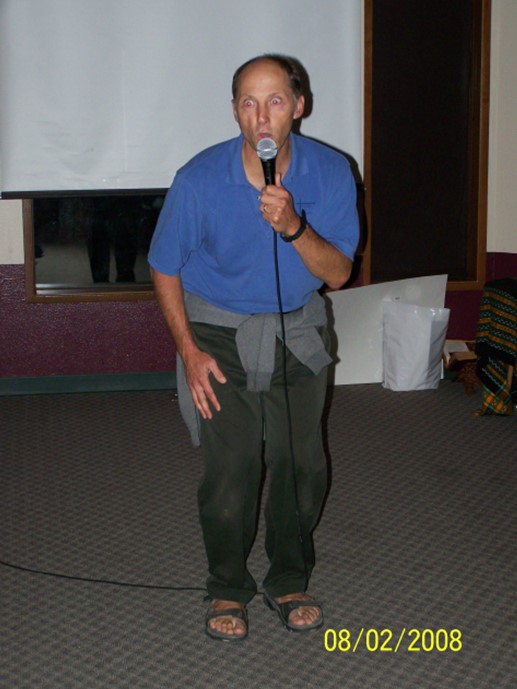
I know! It sounds like a nightmare! However, after being married for 45 years this August, and having now worked for many years as a therapist for couples, married and co-habiting, it is my experience that most spouses and partners would, at one time or another, say they would prefer to be married/partnered to oneself. This actually happened to Lori and me.
We were going through some conflict, nothing major mind you. I was working hard to be a good listener. It was a little challenging since I was standing outside in the howling winds of a snowstorm, the door double-locked, and Lori talking to me from the other side. Those details are unimportant. What’s important is that we were eventually able to sit down and talk. We each wrote down what we needed from the other.
Lori’s list was (and I am not making this up):
Þ When you say you’ll be home at 10 pm, Mr. Youth Minister, you’re home at 10 pm.
Þ When you come home at 10 pm, you do not wake the small children to play with them.
Þ If there are mounds of diapers to be folded and dishes to be washed, there is NO ROMANCE!
Þ If you write a check, record a check.
Þ If you record a check, record it correctly.
Þ If you balance the checkbook…JUST DON’T!!
My list was much shorter:
Þ Don’t sweat the small stuff. (Remember the book of the same name?)
Þ Let’s be flexible.
Þ Let’s play more.
Þ The dishes and diapers can wait…
We each read our list to the other and then started to laugh. Basically, Lori was saying she would prefer to be married to her, and I was saying that I would prefer being married to me. At that point, I heard a voice in my head, and I’m sure it was the Holy Spirit, say: “Now real love can happen in this marriage.” We knew right away what the voice meant. We really needed to accept each other as the other is. And if our needs are not being met, we had to learn how to communicate this to one another and negotiate to get to some common ground so that the marriage would always win. We had to stop the tug-of-war of “I’m not you, and you’re not me,” of pulling against one another; and we needed to do the hard work of pulling together by finding unity in all things.
John Gottman, a University of Washington researcher on love and marriage, wrote in his book, The Seven Principles for Making Marriage Work, that 69% of the conflicts between couples have nothing to do with “right or wrong.” They have everything to do with “I’m not you, and you are not me.” Couples who never learn this truth, remain in a tug-of-war, pulling against each other, until divorce or “death-do-they-part.” They convince themselves that their issues are really about “right or wrong;” but in truth, it’s mostly about “this is what I want, how I like it, how I was raised.”
This tug-of-war marriage leaves one or both spouses feeling hurt, dismissed, and unloved. I have clients who are devout Christians, who have been married for 25, 30, or 40 years, and yet they are miserable in marriage. If their faith helps them at all, it is only to bear the cross of the other; it doesn’t seem to help them find unity, love, and friendship. Rather than learning to accommodate their differences and work for unity, these couples create a negative pattern or “dance” of interaction that they step into anytime they have a disagreement or conflict. Their negative dance reinforces the hurt, distance, and disconnection.
Successful couples learn that this tug-of-war must end. They learn through conflict that they are bumping into their differences. What is needed is effective listening to understand the other, and empathy to validate one another’s emotions. Healthy couples learn to say to one another, “I won’t let you win at my expense, and I won’t try to win at your expense. We are going to find common ground so that the marriage wins.”
Through different issues that have surfaced in our marriage, Lori and I have learned to desire unity over what each of us may prefer. This ranges from simple issues like how we are going to spend our evenings to complex issues like navigating a difficult topic within the family. We are motivated to find unity with whatever the current issue is because tomorrow there will be another issue…and the next day another one. Working for unity day-in and day-out creates a positive pattern or “dance” that reinforces love, friendship, emotional safety, and belonging. After almost 45 years of marriage, we go to bed at night with a profound sense of peace. We don’t have a perfect marriage, but we do have a successful one. Are there times when we don’t quite find unity on an issue, when we misunderstand one another and have hurt one another? Absolutely! But because of the positive dance we have created in our relationship, we are quick to repair, talk things through, learn from our mistakes, and forgive one another.
Unity does not mean uniformity. After all these years, we are still night and day different from one another. On our day off, Lori would prefer to begin it with a cup of coffee, time for prayer followed by time to work the crossword puzzle in the paper. I prefer to begin my day, after coffee, with a long quiet walk in the park. So we compromise, with coffee and prayer together, then her crossword puzzle, my walk. Seeking unity in all things means we strive for agreement on an issue. It also means that one or both of us might say, “I don’t like this decision, but I can live with it without resentment.” And the positive dance goes on!
I would hate to be married to me. Being married to Lori is way better!
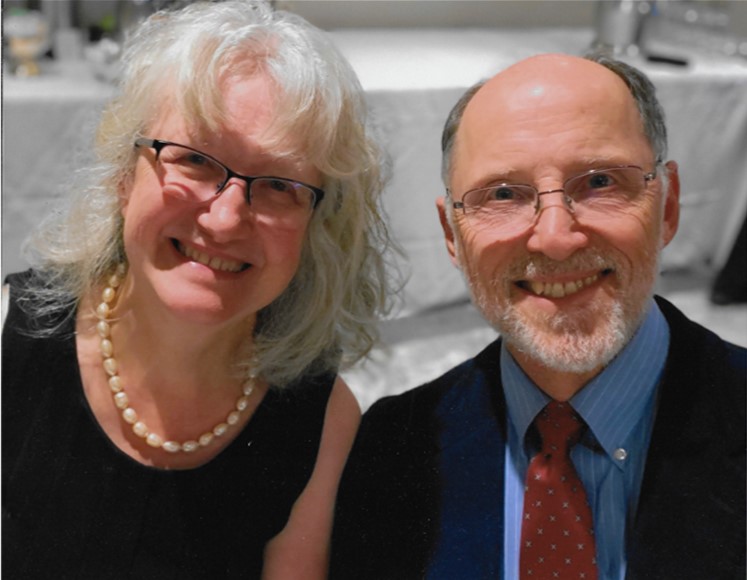
Care for the Earth Poetry and Essay Contest for Youth, Kinder through High School

Lori and I are helping our parish (Assumption Parish, Seattle) celebrate “Present Your Child to God Sunday” on February 19 (changed from Feb 5). We are going to have a grand procession with children ringing bells and waving streamers, and a trumpet player leading the pack playing “O When The Saints Go Marching In.” It ought to be fun.
In addition, we are trying to involve the youth and children in a meaningful way through an essay / poetry contest at the parish. The topic we have chosen is a real life issue, close to the heart of Pope Francis, “Care for the Earth.”
Our children are the Church of today (and not merely of the future). We can start treating them as such by asking them to think about and act on real issues that are critical to human survival like climate change and care for God’s creation.
CLM is hosting a separate poetry/essay contest for our readers and sponsors who do not attend Assumption. We invite you to ask your children or grandchildren to participate in the essay/poetry contest (CLM entries will be judged separately.) Begin by showing them a short (4-minute) video made for children, about Laudato Si, Pope Francis’ encyclical letter.
Go to https://www.youtube.com/watch?v=KOgF2Kgel6k Then children can submit a poem or a 100-word essay on “what it means for you to ‘care for the earth’ during this time of climate crisis.
I showed this video to my grandchildren. Following it, they immediately set to work on writing something:
This is what 3rd-grader Cora wrote: Save the Earth – The earth is a beautiful place full of life but humans are taking more than they need. All things need earth and they matter just much as you. You can help the earth. You can bring back the beauty. You can make a difference. You are special. So, bring back the lush green forest. Bring back the sparkling waters and peaceful animals. Bring back earth. Plant a garden. Feed the birds.
And 1st-grader, Rose: The Earth – Trees, flowers. All things are beautiful. Everyone matters. You matter. We have light in the darkness. We can make the earth better.
3rd-grader, Linus wrote a haiku: Caring for the Earth – Be kind to the earth. Just do it! Do it! Do it! Give back to the earth.
Your youth and/or children can win prizes (they won’t be competing with the Fontana grands).
First place: $25 Second Place: $15 Third place: $10
So please sit down with them, show them the video, and encourage them to write a poem or essay on “Care for the Earth.” Scan and email the essay or poem – one entry per person – to robert@catholiclifeministries.org. Or mail it to us: 1827 NE 58th St, #B Seattle WA 98105. Due by Saturday, Feb 18th. We will select winners for the following age groups:
High School (9th – 12th grade); Middle School (6th – 8th grade); Primary School (Kinder – 5th grade). Please be sure to write the author’s name, grade level, and phone or email on the entry.

St. Brigid’s Day (Feb 1), Ash Wednesday, and Other Non-Essentials of the Christian Life

A person could go all his or her life without observing Ash Wednesday and still be a deeply committed Christian. Obviously the same is true for St. Brigid’s Day. These celebrations include some tangible expression of faith. On Ash Wednesday we receive a cross of ashes on our foreheads. On the eve of St. Brigid’s Day (February 1), we use a kerchief to literally swipe our homes clean of sin with the cloth and then tie the cloth to a tree, where “Spirit-wind” blows the sins away. These actions add meaning and even fun to our faith, and help make our faith very real and earthy. They are outward signs of our beliefs as disciples of Jesus, yet they are not essential to discipleship.
What are the essentials of being a disciple of Jesus anyway? Here are a few that come to mind: belonging to a community of faith that follows Jesus; encountering Jesus in a personal way and making a conscious decision to follow him by living out the Beatitudes; opening one’s life to the Holy Spirit; belonging to a small group where one is personally loved and held accountable as a disciple; participation in public worship and community rites; maintaining a consistent prayer life that involves the praying with/studying of Scripture; engaging one’s faith within daily life; caring for the sick, elderly, poor, and for children.

WOW! That’s a tall order and sounds like a lot of work. These “essentials” are the “meat and potatoes” of following Jesus but, to continue the food analogy, without much seasoning or dessert.
I think that it’s the addition of the non-essentials that adds spice and fun to one’s faith, and shapes a specific identity as Christians (Catholic, Episcopalian, etc.). For example, the liturgical year that divides up secular time into sacred seasons of Advent/Christmas, Lent, Easter/Pentecost, and Ordinary Times, is certainly not an essential feature of being a Christian. Some deeply Christian denominations function perfectly fine without a “liturgical year.” Yet we Catholics, joined by the Orthodox and mainline Protestants, find the liturgical calendar extremely useful to organize the year around the major themes of Jesus’ life, death, and resurrection. In doing so, we think we are better able to fully participate in that paschal mystery year round.
We wait with patience during Advent as we pray for the coming Messiah; rejoice exceedingly as we celebrate the coming of the Messiah in the baby Jesus during Christmas/Epiphany; sit at the feet of Jesus during Ordinary Time to learn about the Kingdom of God; mourn with Jesus for our sins and the sins of the world as we walk with him to Calvary; and shout “Alleluia” as we experience his resurrection and the gift of the Holy Spirit. The liturgical year is a non-essential aspect of Christian discipleship that infuses our faith with the breadth of human emotions. It adds immense depth to Christian discipleship and provides us with an anchor to hang on to our faith amidst the busyness of secular society.
The “Sign of the Cross” is another non-essential and arbitrary practice that Christians do that has helped shape an identity that is deeply Christian and Catholic. In that one action, we remind ourselves of the saving work of Jesus through his death on the cross, and of our dependence on the Trinity, Father, Son, and Holy Spirit. Can a person be a good Christian and never make the “sign of the cross”? Most certainly. Some Christians bow their heads when they begin a prayer. Catholics (and Orthodox) make the “Sign of the Cross.” It reminds us to quiet ourselves and be attentive to what God is doing in the moment, whether it is followed by the blessing of a meal or the committal of a beloved family member to the grave.
I think a relationship with Mary, the mother of Jesus, especially manifested through the practice of praying the rosary and the veneration of her image in ICONS, is a non-essential practice of Christian discipleship. One could go his or her entire life without ever praying to God through Mary, much less saying the rosary, and still be a deeply committed follower of Jesus. St. Paul makes no mention of Jesus’ mother except in one obscure text in Galatians (4:4). Certainly Paul never prayed to Mary and never thought that what she brought to the life of a disciple was important enough to write about. Protestants, taking their cue from Paul, also do not pray to Mary (or the saints) and yet are still following Jesus as committed disciples. Mary, ICONS, and the rosary are non-essentials to Christian discipleship. Yet Christians have prayed to God through Mary since the early days of Christianity. Devotion to Mary, so deeply imbedded in Catholic and Orthodox cultures, is a wonderful gift from God that deepens faith, hope, and love.
Of course, there are many other non-essentials such as observing the feast days of saints, praying to St. Anthony for lost items, blessing pets on the feast of St. Francis, wearing religious medals and scapulars, lighting candles as a prayer offering, fasting on Wednesdays and Fridays, and “burying the Alleluia” on Mardi Gras, the Tuesday before Ash Wednesday. None of these practices are essential to Christian discipleship and, if done without the essentials, don’t have much meaning. But when these rituals are done in conjunction with being an active follower of Jesus, they have the capacity to shape a Catholic Christian identity that gives a person deeper roots and brings joy and fun to the Christian life.
So add some spice to your faith life. On St. Brigid’s Day (Feb. 1), wipe your home clean of sin and on Mardi Gras (Feb. 21)) bury the Alleluia (see rituals below). Then on Ash Wednesday, the very next day, go to the nearest Catholic Church and get your ashes (even if you are not a Catholic).
_______________________________________

For the Eve of St. Brigid’s Day “Spring Cleaning” (January 31)
Prayer: Saint Brigid, daughter of Ireland and lover of Jesus, draw us by your prayers into the living flame of God’s love. Help us to clean our hearts and homes of all that is selfish and self-centered. We forgive all who have hurt us and ask God to forgive our sins as well.
Pray for us, St. Brigid, that we will be attentive to the poor and spiritually abandoned, that we will practice the Beatitudes in good times and bad, and that the warmth of God’s love will animate all that we say and do.
Activity: Each member of the home takes a kerchief or handkerchief in hand and walks through the house dusting the furniture and books, lamps, etc. singing “Alleluia, alleluia, alleluia.”
When the house has been thoroughly dusted, all go outside and tie the kerchiefs on the branches of a tree. The myth is that, on the eve of her feast day, in the grace of God and the power of the Holy Spirit, St. Brigid travels through the land with her prayers to remove the dust and sin, and even ailments, from our lives.
Closing Prayer: St. Brigid, come this day, to our home and hearts, come by the power of God, and be our guest. And help us, dear Brigid, to wipe away the dust of “me, my, and mine” that we might love others as disciples of Jesus with a selfless heart. Amen.
Our Father…
Leave the kerchiefs and handkerchiefs on the tree for a week or until Ash Wednesday.
BURY THE ALLELUIA ON ASH WEDNESDAY (Feb 22) or on the Eve of Ash Wednesday (Mardi Gras)
All Alleluia! Alleluia! Alleluia!
Leader For the 40 days of Lent, the Church “buries the Alleluia” by refraining from singing this sacred word in our liturgy. We do so to remember the Lord Jesus, God’s alleluia, the Lamb of God, who took the sins of the world with him to the grave so as to rob them of their power to destroy life.
What are the sins of the world today that destroy life? Say them aloud as you write them on a sheet of paper bearing the word “Alleluia.”
[After all have written the “sins of the world” on the sheet, the “Alleluia” is placed in the ground and buried with dirt in the same way that Jesus who died for the sins of the world was buried in a tomb following his death.]
All Gracious God and Father, your beloved Son Jesus suffered death to give us life. Help us during this Lenten season to deny ourselves and serve others in imitation of Him who lives with you, and the Holy Spirit, one God forever and ever. Amen!
